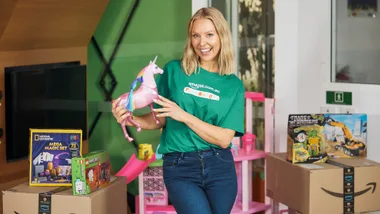The build-up to bringing home a baby is an exciting, emotional and busy time. Big changes are afoot for everyone, including your pets.
But in the haste of choosing which colour to paint the nursery or which pram to choose, celebrity vet Dr Katrina Warren says our four-legged family members often get forgotten.
“If your dog or cat is used to being the centre of your universe, it is understandable it may experience something similar to ‘sibling rivalry’ when you introduce your new baby to their world.”
Fortunately, however, Katrina says that most pets adapt very well to the arrival of a baby.
PREPARE WELL IN ADVANCE
“If your pet has been a substitute child up until now, you are no doubt already feeling guilty knowing your human baby will soon become your number one priority,” Katrina says. “One of the worst things you can do is ‘spoil’ your pet in the lead-up to the baby’s arrival, wanting it to have as much love and affection as possible.”
Instead, Katrina recommends making changes to your pet’s routine before baby is even close to coming home.
“You don’t want your pet to associate the baby with any major changes to its lifestyle – you want bub to be seen as a positive in your pet’s eyes,” Katrina says. “If you no longer want to allow your pet in the bedroom, on the sofa or inside the house, start making these changes a few months in advance. Drastically decreasing attention, scolding or isolating your pet for things he is used to doing after the baby arrives will likely cause stress for your pet.”
DEAL WITH BEHAVIOURAL PROBLEMS … PRONTO!
With dogs, problem behaviours such as jumping up, pulling on the lead and barking need to be dealt with. At the very least, your dog must learn to sit and lie down on your command – even from a distance. You also want your dog to be comfortable spending time on its own and be happy to go outside at your request.
If your dog shows behaviours such as growling, guarding or biting, do not ignore them. “You should seek professional help immediately from your veterinarian or enlist a professional dog trainer,” advises Katrina. “Many people get so anxious about their dog’s behaviour they inadvertently send all the wrong signals to their dog which can make the problem worse.”
FAMILIAR FRIENDS
One month before you give birth, let your dog or cat have a look around the nursery to get used to the new sights and sounds. Ask friends with infants to visit your home to accustom your pet to babies, or download baby noises and play at a low level until your pet is no longer interested in the sound of crying.
If you’re going to be taking your dog on walks with you and your baby, it’s a good idea to do a few beforehand.
“People might think you’re strange but getting used to managing your dog and a pram can be tricky at first, so do some practice runs with an empty pram,” says Katrina. “This will also get your dog familiar with the pram and the different pace he might have to walk alongside it.”
If you want the nursery to be off-limits to your pet, installing a temporary screen door or baby gate across the door can be useful. This will allow your pet to see and hear what’s happening in the room and you will be able to hear and see your baby and be comfortable knowing your cat or dog has not curled up for a nap with your newborn.
Once baby is born, before bringing her home, get your partner to bring a blanket or clothes with the scent of your baby home from the hospital first. This way your pet can familiarise itself with the smell of your bub.
“If possible, get someone to take your dog for a run shortly before you bring the baby home so your dog is less likely to be excitable because he will have not seen you for a few days,” says Katrina. “For the initial greeting, it’s a good idea to have someone else hold your baby. Once your dog is calm, have that person bring the baby in to you.
“Don’t make a fuss. If your dog is curious, that’s fine. If he ignores the baby, that’s fine too,” adds Katrina. “Everyone needs to be positive and tell your dog what a good boy he is. You want your dog to see the baby as a positive change.”
It’s also important for your dog to associate the baby with fun times, says Katrina.
“Feed your dog when the baby is present elsewhere in the room so your baby is there for this favourite time of day,” says Katrina. “And don’t get angry with your dog for taking the baby’s toys. He will not know why you’re shouting and may associate the smell of the baby with getting in trouble.”
For more expert advice and the information mums need to know about caring for their babies and toddlers, grab a copy of Mother & Baby magazine, on sale now!






.png?resize=380%2C285)





